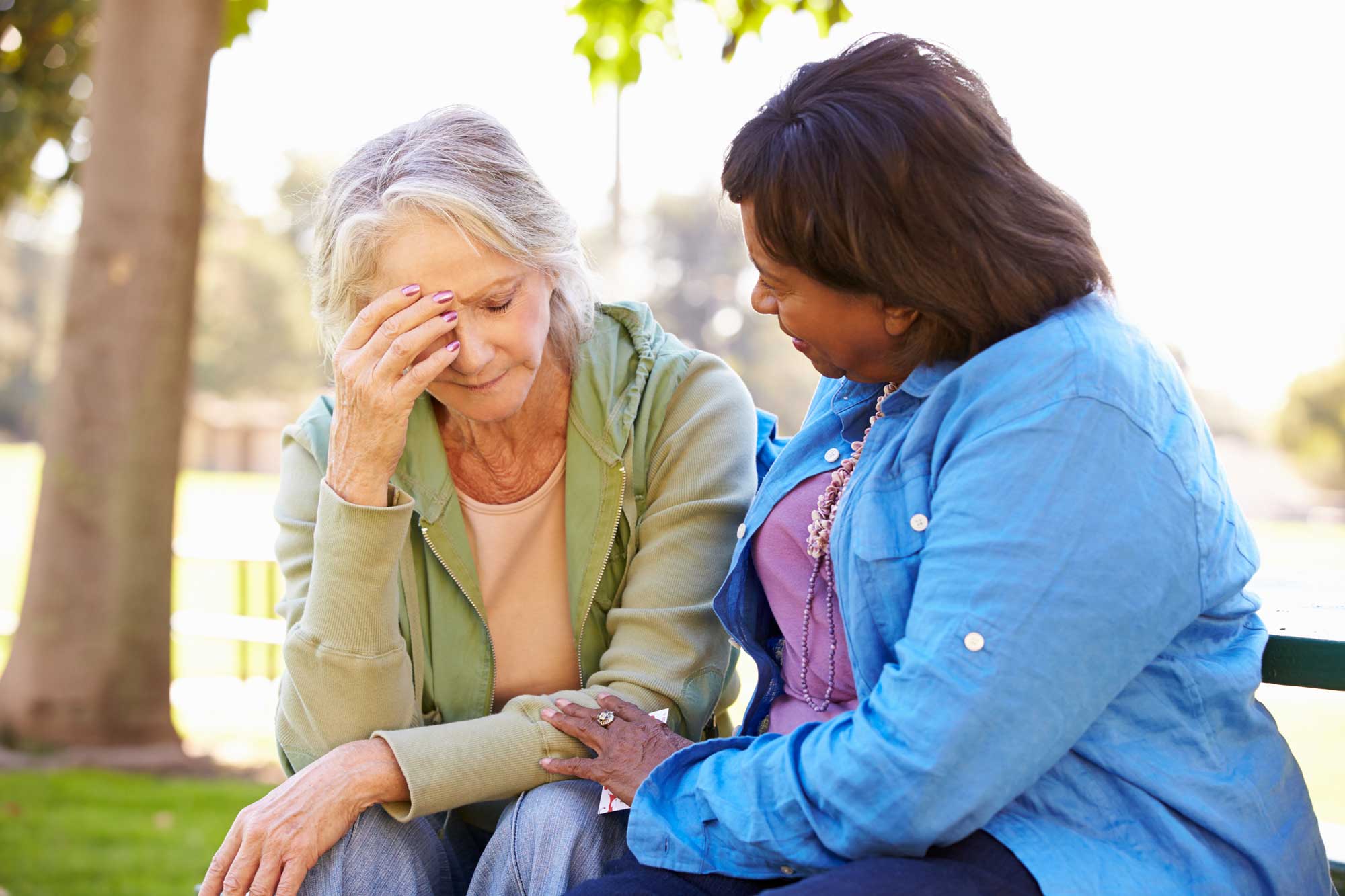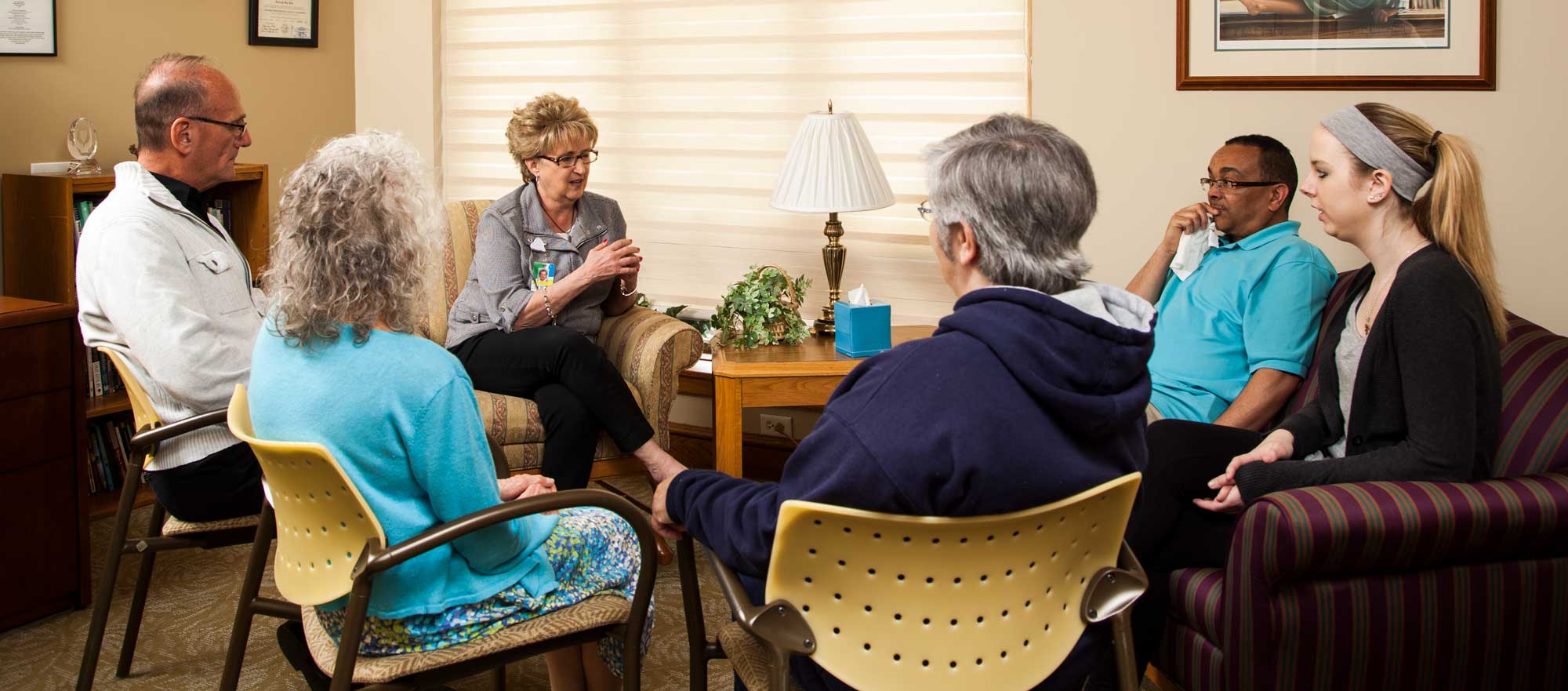Resources for Grief Counseling
Click on the articles below designed to provide you and your family with helpful information about various aspects of the grieving process.

When to Seek Professional Support
Although normal grief can be a painful process that at times feels like an emotional roller coaster, there are times when professional grief support may be needed. Some of the “red flags” that signal the need for professional support include:
- You feel “stuck” and unable to see any change in either the intensity of your grief or progress in adjusting to your altered circumstance.
- You find yourself using alcohol, medication or other drugs to cope.
- You have active suicidal thoughts.
- Your physical health is being impacted by your grief.
- You feel overwhelmed or immobilized by the demands of daily life.
- You continue to struggle with accepting the reality of your loss.
- You are plagued by feelings of guilt and remorse.
- You feel isolated with no one to turn to.
- You feel hopeless about the future.
- Even though sufficient time has lapsed, you are unable to feel interest or joy in other things or other people.
- You are plagued by distressing memories or disturbing thoughts.
- You feel anxious and worried much of the time.
- Anger and bitterness related to the death are impacting your relationships with others.
- You feel like you are falling apart or your life is spiraling out of control.
- You find yourself engaging in behaviors that are not good for you.
- Others express concern for you and encourage you to seek professional assistance.
- You think you need professional help.
A call to Pathways of Hope will link you to caring, compassionate support, whether your concerns are for yourself or for someone else you love.
“Your counselor will work with you to identify your goals for counseling as well as a plan of action designed to meet your goals and needs.”
— Pathways of Hope
Individual Grief Counseling: What to Expect
Meeting with a grief counselor individually is the recommended choice when the loss is very recent, or when grief feels overwhelming, unmanageable or interferes significantly with the ability to manage day-to-day responsibilities. Uncertainty and misconceptions about counseling services can create unnecessary barriers for many who might benefit from talking out their concerns in a confidential setting with a professional bereavement counselor. Knowing what to expect can dissipate unnecessary anxiety and make the process more comfortable and predictable from the beginning.
At Pathways of Hope, grief counseling is a straightforward process. Thanks to the generosity of community donors, our counseling services are offered without charge, thus eliminating financial obstacles and concerns about insurance coverage.
When you call to make your first appointment with a Pathways of Hope grief counselor, you will be offered your choice of several appointment times. If you are seeking services for a child or teen, you will be asked to meet with the child’s grief counselor prior to the child’s first appointment. We will ask that you complete some routine paperwork prior to your first meeting in order to minimize the time spent in the first session gathering basic information and attending to routine administrative tasks. We may mail you the required forms or ask that you come a bit early to complete them prior to your appointment time.
During your first counseling session, your bereavement counselor will spend a few minutes reviewing your information with you and the rest of the time will be spent exploring your concerns and answering any questions you may have. Your counselor will work with you to identify your personal goals for counseling as well as a plan of action designed to meet your goals and personal needs.
This plan may involve a few more sessions, education about what to expect in the grieving process, guidance regarding helpful grief resources, suggestions related to coping strategies, “homework” assignments or possibly referrals to specialized community services. In some cases, particularly for those involving children or teens, art therapy techniques may be recommended as a means of working toward counseling goals.
Most people are pleasantly surprised to discover that a lot of progress can be made in just a few hour-long sessions. Many will then make the transition to a grief group for ongoing support. In the event that long-term or specialized services are recommended, your counselor will work with you to locate appropriate resources.

Bereavement Support Groups: Could They Be Right For Me?
Grief support groups offer bereaved persons opportunities to find comfort, hope and healing in a safe and supportive group environment. Meeting with others who are facing similar challenges can provide an effective alternative to relying solely on friends and family for emotional support.
When people hesitate to avail themselves of grief support services, their hesitation often centers on questions such as:
- What will the group be like?
- What if I don’t feel comfortable about sharing?
- Will anyone in the group really understand what I’m going through?
The decision to attend a grief support group often feels like a big step. Feeling a bit anxious and nervous about being a “first timer” is quite normal. It may help to know that every member of the group recognizes the courage it takes to reach out for support when you are hurting. You will also discover that although the group will be very interested in hearing about your loss and concerns, they will leave it up to you to decide what and when you want to share.
Discovering that the group is a place where you don’t have to pretend that everything is OK can bring a real sense of relief. As for worries about tears, everyone in the group knows that tears are a normal part of grief. You won’t be the first or last person to need a tissue or two to dry your eyes. There is plenty of understanding to go with our supply of tissues.
If you are wondering whether one of our grief support groups might be right for you, it may be helpful to know what participants have said when asked for feedback about their group experience. The following comments are typical:
- “It helps so much to be able to share my grief and have others listen and understand.”
- “The time spent listening to others has been very helpful.”
- “It really helps to know I am not the only person going through this.”
- “Knowing that my grief is shared with others and they understand better than most really helps.”
- “I am so glad I finally decided to come.”
All of our support groups are open to anyone in the community who is coping with the loss of a loved one. It is strongly recommended that you wait two to three months after your loss to attend a support group. When loss is fresh and pain close to the surface, the pain of others may feel overwhelming — individual counseling, rather than group, is the recommended choice for support early on. Some groups require no pre-registration or commitment for a set number of sessions; it’s up to you how frequently you choose to attend. Other groups may require pre-registration and a commitment to a set number of sessions.
For information and a schedule of current groups, please call your local Pathways of Hope.
“One day we will remember how lucky we were to have known their love, with wonder, not grief.”
— Elizabeth Postle
Frequently Asked Questions About Pathways of Hope
Q: WHAT IS PATHWAYS OF HOPE?
A: Pathways of Hope is the grief counseling service for all Ohio’s Hospice patients, families and friends, as well as those in our communities who are anticipating or have suffered the loss of a loved one. Our mission is to offer bereavement support, information and education to bereaved individuals and families.
Q: WHO CAN TAKE ADVANTAGE OF PATHWAYS OF HOPE SERVICES?
A: Pathways of Hope services are offered to all who are bereaved in our communities, regardless of whether Ohio’s Hospice services have been used.
Q: DO YOU PROVIDE SERVICES TO PEOPLE WHO ARE DEALING WITH LIFE-LIMITING ILLNESS?
A: Yes, grief support services are available to individuals and families facing the challenges of a life-limiting illness.
Q: WHERE ARE YOU LOCATED?
A: Pathways of Hope services are available from all Ohio’s Hospice affiliate locations and in sites throughout the communities we serve. Please call for current information.
Q: ARE COUNSELING SERVICES PROVIDED BY STAFF OR VOLUNTEERS?
A: Pathways of Hope counseling staff members are professionally trained and licensed social workers or professional counselors, with additional training and expertise related to grief and loss. Trained volunteers serve in other roles within Pathways of Hope, but not as counselors.
Q: HOW MUCH DO YOU CHARGE FOR YOUR GRIEF COUNSELING SERVICES AT PATHWAYS OF HOPE?
A: Most Pathways of Hope grief counseling services are offered without charge. Although we do charge a nominal registration fee for some camp programs, financial aid is always available in situations of hardship. The costs of our services are supported through the generosity of community donors. While not expected, donations are always gratefully accepted to offset the costs of materials and services.

